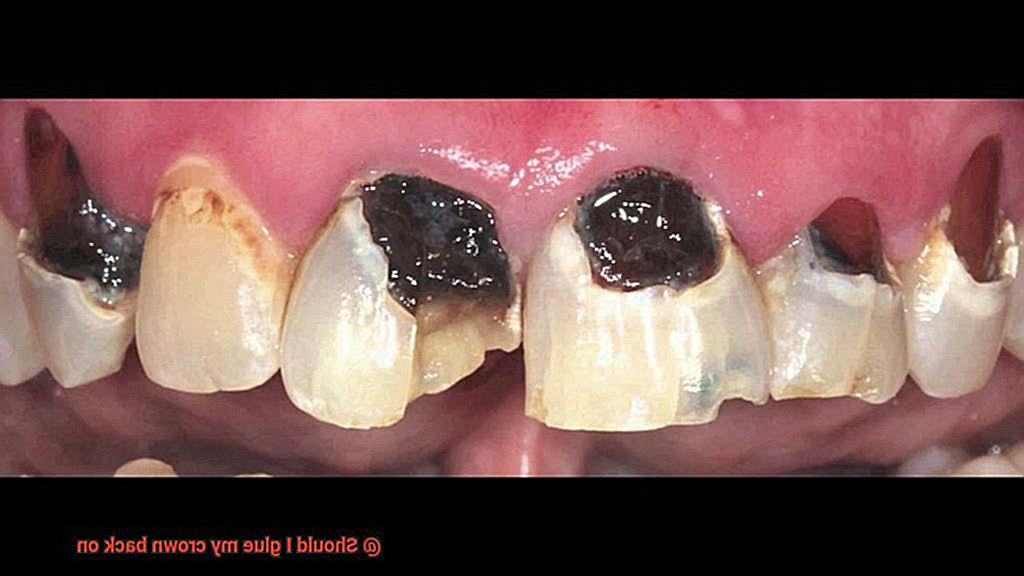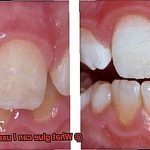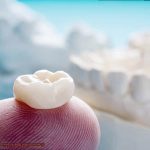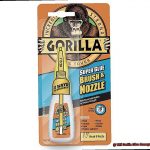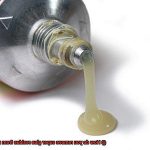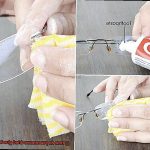Have you ever experienced the gut-wrenching moment of your dental crown falling off? The feeling of shock and discomfort can be overwhelming, leaving you unsure of what to do next. Whether it happened while eating something sticky or crunchy or simply came loose during your daily brushing routine, a missing or loose crown can be distressing. So now the question arises: should you try to glue it back on yourself or rush to the dentist for an emergency appointment?
Before we dive into that, let’s understand that dental crowns are not meant to last forever. They are durable and can last for several years, but they are susceptible to wear and tear, decay, and other issues that may cause them to come loose or fall off. If you find yourself in such a situation, the first step is to determine whether it’s a true dental emergency or not. In some cases, over-the-counter dental cement or even toothpaste can help temporarily reattach the crown. However, each case is unique, and it’s important to weigh the pros and cons of attempting a DIY fix versus seeking professional help.
In this blog post, we’ll delve deeper into this common question: should I glue my crown back on? We will explore all the factors you need to consider when deciding whether to attempt a temporary fix at home or book an appointment with your dentist as soon as possible. From understanding the risks involved in DIY crown repairs to learning how to properly care for your dental crowns over time – we’ve got you covered. So sit back and read on as we guide you through everything you need to know about your dental crown woes.
What is a Crown?
Contents
Look no further than a crown. A crown is a dental restoration that is placed over a tooth to cover and protect it. Made from materials like porcelain, ceramic, or metal alloys, crowns are an effective way to improve the appearance and strength of your teeth.
Crowns can be used for various reasons, such as restoring the shape or size of a damaged tooth, strengthening a weakened tooth, or improving the appearance of a discolored or misshapen tooth. When other types of dental restorations like fillings are not enough to repair a damaged tooth, crowns are recommended.
There are several types of crowns available, each with their own advantages and disadvantages. For example, porcelain or ceramic crowns offer a more natural appearance but may not be as durable as metal crowns. Metal crowns may be stronger but can be more visible in the mouth.
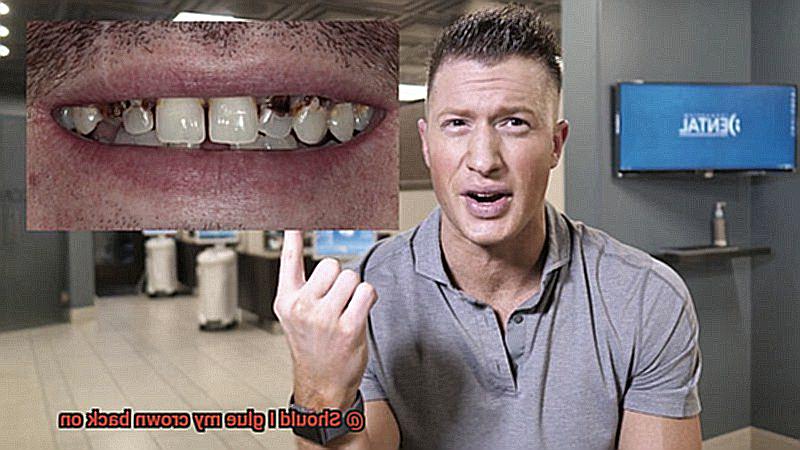
If you experience a loose or fallen-off crown, it’s crucial to seek professional help from a dentist rather than attempting to glue it back on yourself. Gluing a crown may seem like a simple fix, but there are risks involved that only a trained professional can address.
Reasons Why a Crown May Fall Off
A dental crown falling off can be a daunting experience, causing discomfort, embarrassment, and even pain if the underlying tooth is exposed. But what causes a crown to fall off? Here are five reasons why it might happen and how you can prevent it.
Wear and Tear
Like anything else, crowns can wear down or become damaged over time, causing them to loosen and eventually fall off. If you notice your crown starting to feel loose or experience any discomfort, it’s important to see your dentist as soon as possible. Regular dental check-ups and good oral hygiene habits can help prevent wear and tear.
Decay
Tooth decay is another common cause of crowns falling off. Decay weakens the foundation of the crown, causing it to loosen and fall off. Maintaining good oral hygiene habits, such as brushing twice daily and flossing regularly, can help prevent decay from forming underneath the crown.
Trauma
A blow to the mouth or biting down on something hard can cause trauma to the tooth or crown, leading to it coming loose or falling off. If you experience any trauma to your mouth, it’s important to see your dentist right away to assess any damage.
Poor Fit
A poorly fitted or installed crown may not be able to stay in place and can eventually fall off. It’s essential to seek professional help from a qualified dentist when getting a dental crown to ensure a proper fit.
Gum Disease
Gum disease can cause the bone and tissue around the tooth to deteriorate, leading to a weakened foundation for the crown. Regular dental check-ups and good oral hygiene habits can help detect and prevent gum disease from occurring.
If your dental crown falls off, it’s crucial not to try and glue it back on yourself as this can cause further damage to your tooth and potentially harm your health. Instead, seek help from your dentist as soon as possible. They will be able to examine your tooth and determine why the crown fell off, and provide you with the best course of action. In some cases, they may be able to reattach the crown, but in other cases, a new crown may be necessary for long-term solutions and overall dental health.
Risks of Gluing a Crown Back On Yourself
While it may seem like a simple solution, there are serious risks involved. Improper placement of the crown can lead to further damage to your tooth or surrounding teeth, such as cracks, fractures, or even root damage.
In addition to physical damage, self-gluing a crown can also result in infection. If the crown is not properly cleaned and disinfected before being reattached, bacteria can enter the tooth and cause an infection. This can lead to pain, swelling, and possibly even tooth loss if left untreated.
Using over-the-counter dental adhesives is another potential risk. These adhesives may contain harmful chemicals that can irritate your gums and cause allergic reactions. If they are not applied correctly, they may cause the crown to come loose again or even become permanently stuck in place. This could make it difficult for a dentist to remove it if necessary.
It’s crucial to remember that a crown that has fallen off should be assessed by a dental professional as soon as possible. They can determine whether the crown can be safely reattached or if a new crown is needed. Even though it may seem like a cost-effective solution, attempting to glue a crown back on yourself could end up costing you more in the long run if further damage or infection occurs.
Should I Glue My Crown Back On?
While it may be tempting to reach for the glue, it’s important to take a moment and evaluate the situation. Before attempting to reattach your crown, it’s crucial to determine why it fell off in the first place.
In most cases, crowns come loose due to decay or damage to the tooth underneath. If this is the case, simply gluing it back on will not solve the underlying problem. In fact, this could even trap harmful bacteria and food particles underneath the crown, leading to infection and further damage.
However, if the tooth underneath the crown is healthy, then it may be possible to reattach it using dental cement as a temporary solution until a dentist can properly evaluate and treat the tooth.
It’s important to note that attempting to glue your crown back on without proper knowledge and equipment can lead to further damage or even infection. That’s why it’s always best to seek advice from a dental professional before attempting any DIY solutions.
Professional Help for Long-Term Solutions
We advise against that. Seeking professional help for long-term solutions is the way to go.
Your dentist will assess the damage and determine the best course of action, which may include re-cementing the crown or replacing it entirely. By relying on a dental professional, you’ll ensure that the issue is resolved effectively without causing any further damage or misalignment.
Moreover, your dentist can identify any underlying issues that may have caused the crown to come loose in the first place. By addressing these issues, they can prevent future problems with the crown or other teeth.
Although seeking professional help may require a larger upfront cost, it can ultimately save you money in the long run by preventing further damage and avoiding additional dental work. Additionally, prioritizing your oral health is crucial for maintaining a healthy smile and overall well-being.
8v-urPpW8Z4″ >
Conclusion
In conclusion, losing a dental crown can be a worrisome experience, but it’s essential to resist the urge to fix it yourself. Instead, seek professional help from your dentist as soon as possible.
Dental crowns are not indestructible and can loosen or fall off due to various reasons such as decay, gum disease, trauma, poor fit, or wear and tear. While using over-the-counter dental cement or toothpaste may seem like a quick fix, it’s important to understand that these DIY fixes can cause more harm than good.
Attempting to glue your crown back on yourself can lead to physical damage like cracks, fractures or root damage. Additionally, if the crown is not properly cleaned and disinfected before being reattached, infections can occur. Over-the-counter dental adhesives may also contain harmful chemicals that could irritate your gums and cause allergic reactions.
To ensure long-term solutions that address the underlying problem without causing further damage or misalignment, it’s crucial to seek professional help from your dentist. They will assess the damage and determine the best course of action which might include re-cementing the crown or replacing it entirely.
Maintaining good oral hygiene habits and regular dental check-ups is essential for preventing crowns from becoming loose or falling off in the first place. Remember that trying to glue your crown back on by yourself without proper knowledge and equipment could end up costing you more in the long run if further damage or infection occurs.
Prioritizing your oral health is crucial for maintaining a healthy smile and overall well-being.

